A home library serves as a haven for learning, creativity, and leisure in addition to being a place to store books. It provides a haven from the hustle and bustle of everyday life where one may immerse themselves in various concepts and realms.
Whether you’re a casual reader or an avid bookworm, creating a home library that expresses your individuality and maximizes usefulness may greatly improve your reading experience.
Every little detail, from selecting the ideal shelves and furnishings to adding comfortable seats and soft lighting, adds to the overall ambiance.
Home Library Decor Tips
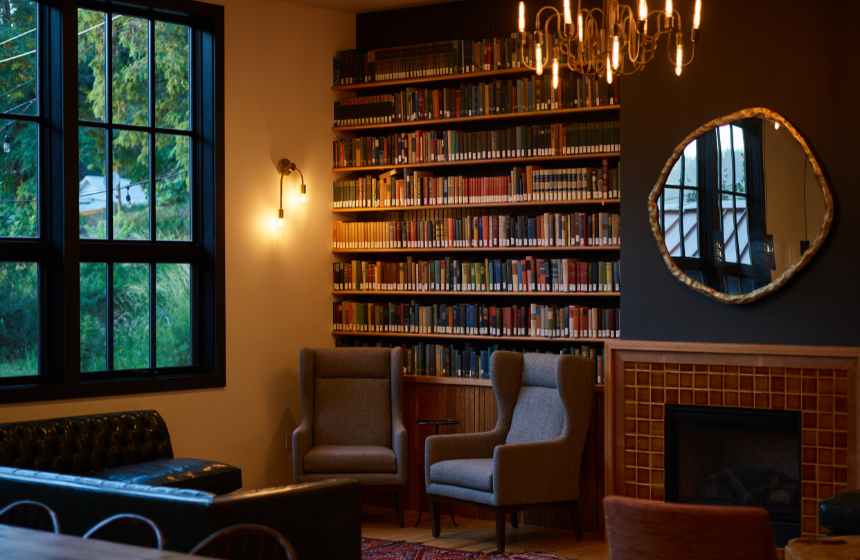
In order to assist you in creating the ideal reading getaway that suits your particular requirements and taste, we’ll look at a variety of home library decor tips in this post.
Also Read: 12 Genius Home Bedroom Items on a Budget
Why Invest in a Home Library?
Investing in a home library fosters your intellectual and emotional development in addition to improving your living environment. Let’s read carefully!
1. Personal Sanctuary
You may withdraw from the outer world in the privacy of your own home library. Environmental psychology research indicates that providing a specific area for rest and learning might lower stress and improve wellbeing (Kaplan & Kaplan, 1989). It’s a place devoted to your loves and interests that lets you focus on reading and creation without interruptions.
2. Enhances Focus and Productivity
A well-designed library creates an atmosphere that is favorable to focus and production. According to research, having a customized workplace may greatly increase productivity and attention (Wang et al., 2015). A home library offers a specialized area that reduces distractions and helps you reach your full potential, whether you’re reading, learning, or working on creative projects.
3. Reflects Personal Style
Your home library’s layout, furnishings, and book selections may all reflect your individuality. It’s a chance to design a room that truly feels like you. A well-curated library, as suggested by interior design expert Sarah Susanka, reflects personal preferences and sparks discourse, transforming your house into a distinctive representation of your identity (Susanka, 2001).
Also Read: Top Home Decor Mistakes to Avoid for Stylish Spaces
Key Elements of Home Library Decor
You may design a home library that is not only useful but also accurately captures your character and love of reading by carefully combining five essential components. Let’s get started!
1. Solutions for Book Storage

a. Shelves for books: The focal point of each library is its bookshelves. Select shelves that suit your style, such as trendy floating shelves for a current vibe or classic hardwood bookshelves for a timeless appearance.
Different book sizes may be accommodated by adjustable shelves, which maximizes organization and space. According to research, the accessibility and organization of books can affect how often and how much people like reading (Dixon & Fox, 2015).
b. Creative Storage: Use your imagination to come up with innovative storage ideas. Books may be displayed and kept in vintage luggage, wooden crates, or ornamental boxes that also provide personality.
Distinct storage solutions showcase your originality and add to a customized look (Griffiths, 2020).
2. Comfortable Seating
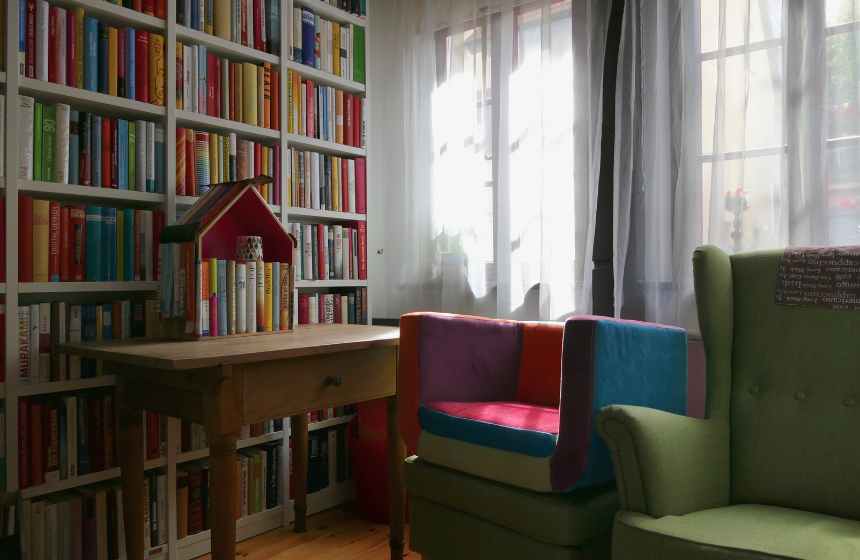
a. Reading Nook: Reading Nook Choose a comfy area with chairs for reading. Long reading periods might be encouraged by a cozy chaise couch or armchair. It becomes a perfect haven when a side table for snacks and beverages is added.
b. Variety of Seating Options: Include a variety of seating alternatives, including a tiny sofa, bean bags, or floor cushions. This variety welcomes visitors and creates a laid-back vibe that encourages conversation and group reading sessions (Johnson, 2019).
3. Lighting

a. Natural Lighting: Place your library next to windows to take advantage of the most natural light. To bring in sunshine without sacrificing privacy, use sheer curtains. Natural light enhances mood and productivity in addition to producing a cozy ambiance (Kellert, 2008).
c. Lighting Layers: Use a variety of lighting sources to improve atmosphere and usability. To create a comfortable, well-lit area, use wall sconces, table lights, and floor lamps.
Adaptable lighting choices accommodate various moods and duties by enabling you to customize the brightness based on your activity (Faber, 2017).
Also Read: Minimalist Home Decor: Essential Tips for a Neat & Clean Space
4. Color Palette
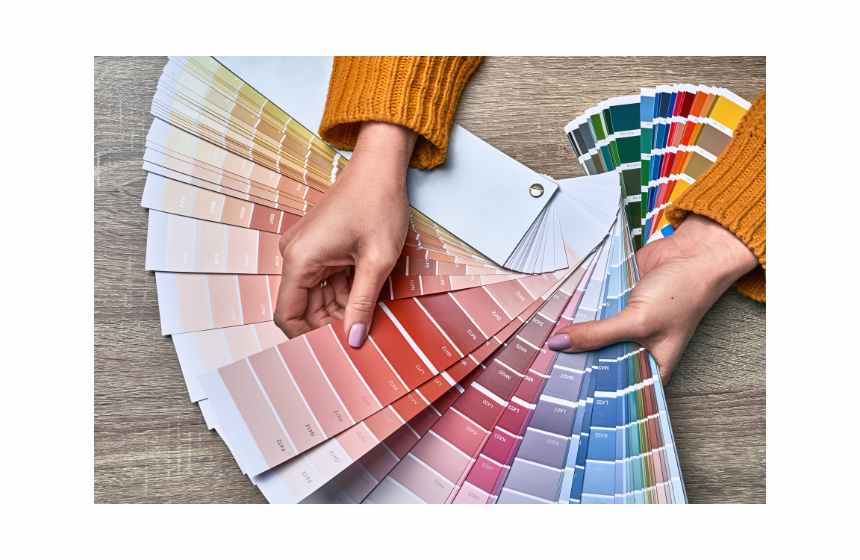
a. Warm Tones: To create a feeling of comfort, choose a warm color scheme. In addition to complementing wooden furniture and book covers, colors like beige, light browns, and subdued greens create a calming atmosphere.
According to color psychology, warm hues can foster creativity and relaxation (Elliot & Maier, 2014).
b. Accent Walls: To create visual interest, think about using wallpaper or painting one wall a more striking color. Bookshelves and artwork look great against a deep blue or forest green background, which attracts the attention to the main point.
5. Personal Touches

a. Art and Decor: Art and Decor Include pieces of art and decor that speak to you. Select inspiring pictures, paintings, or framed prints. You may reinforce your passion of books by adding a themed touch by putting quotes or literary artwork on display.
b. Memorabilia & Souvenirs: Display treasured artifacts, family heirlooms, or mementos from your trip. A sense of belonging is fostered and the room becomes distinctively yours thanks to these personal touches that tell a story (Baker & O’Connor, 2016).
6. Functional Layout

a. Establishing Zones: Establish separate areas in your library for studying, reading, and unwinding. Area rugs and furniture placement may help define each room and accomplish this.
A harmonic flow and improved usefulness are the results of effective zoning (Lindh & Lentz, 2018).
b. Unobstructed Routes: Make sure there are clear routes between the sitting sections and the shelves. This facilitates accessibility and simple mobility, improving your library’s overall experience and making it more welcoming to patrons.
Also Read: Biophilic Design: Integrating Nature into Modern Home Decor
7. Use Technology

a. Intelligent Storage: Think about integrating technology into your library to improve it. Your collection may be digitally arranged and categorized by smart bookshelves, making information easily accessible.
You may make your experience more efficient by using applications to manage your reading lists and favorite books.
b. Charging Stations: Set aside spaces for gadget charging. Adding outlets to your library combines modern convenience with usefulness by enabling you to use computers, tablets, and e-readers without the mess of wires (Katz, 2020).
8. Greenery and Plants
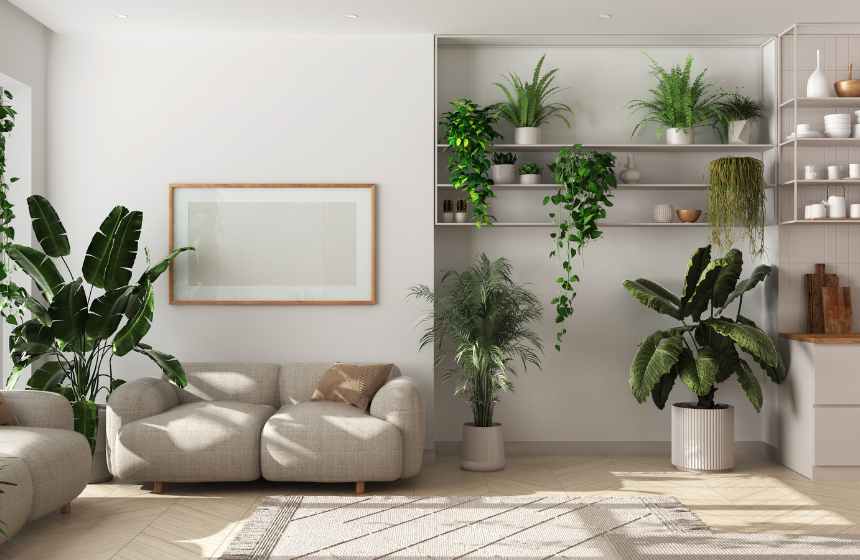
a. Indoor vegetation: Your library may become more vibrant and fresh by adding plants. To enhance air quality and create a relaxing ambiance, use low-maintenance indoor plants like pothos or snake plants.
According to studies, greenery can improve general wellbeing and cognitive performance (Kaplan & Kaplan, 1989).
b. Decorative Planters: Make use of ornamental planters that go well with your interior design. Using hanging planters or arranging plants on shelves creates visual appeal and creates a calm, welcoming atmosphere.
Also Read: 3D Printing in Home Decor: Custom Designs & Innovations
Advice on Setting Up Your Home Library
By putting these organizing suggestions into practice, you’ll build a useful and aesthetically pleasing home library that will enhance your reading pleasure.
1. Sort Your Collection by Category

Sorting your books by author, genre, or color may greatly improve both appearance and usefulness. You can easily locate particular book genres, including fiction, non-fiction, or fantasy, thanks to genre organization.
As an alternative, grouping by author produces a simplified appearance that might draw attention to your favorite authors. Consider grouping your collection by color for a visually arresting impact that will make it a lively display that attracts attention.
Regardless of the approach you use, be sure to mark your shelves if necessary so that anybody can find their way around your collection with ease.
2. Create a Reading List

A designated “to-read” shelf or a conspicuous reading list may serve as a powerful source of inspiration. Write down the novels you wish to read next on a chic notepad or blackboard in your library.
This helps you stay on top of new titles and acts as a visual reminder of your reading objectives. To help you recall your feelings and ideas about each book, you can also think about keeping a real notebook or a digital app where you can write notes and reviews.
Also Read: The Rise of Modular Furniture: Flexibility and Style for Future Homes
3. Rotate Your Collection

Your library will remain welcoming and new if you rotate your selection of books on a regular basis. Think about putting new books on display or allocating a section for seasonal reading that focuses on pertinent themes or genres.
This not only makes your shelves seem better, but it also motivates you to go back and read books you might have forgotten. To make sure you’re consistently interacting with various titles, you may also set up a rotation plan, perhaps monthly or quarterly.
4. Regular Maintenance

Set aside time for routine upkeep to maintain a clean and inviting library. To keep your library looking welcoming, plan a monthly cleaning to dust shelves and clean surfaces.
This is also a great opportunity to rearrange your books; think about eliminating those you don’t want to keep. It could be time to give a book away or give it to a friend if it hasn’t been touched in years.
In addition to keeping your library looking its best, routine maintenance enables you to re-establish a connection with your holdings and make well-informed judgments about what to maintain.
Also Read: Smart Home Decor: Technology with Style for a Modern Living Space
DIY Decor Ideas for Your Home Library
You can design a home library that is not only useful but also a genuine representation of your personality and passion for reading by using these do-it-yourself decorating ideas.
1. Book Page Art

Turn used book pages into lovely wall art that honors your passion for reading. You may make a bigger collage that incorporates different styles and content, or you can frame individual pages.
Think about utilizing pages from books that are old or have exquisite pictures. Include other components, such as ornamental paper or fabric swatches, to provide depth.
To add a special, individual touch to your library, you might also make a series of themed artworks, such as quotations from your favorite writers or passages from well-known books.
2. Repurposed Furniture
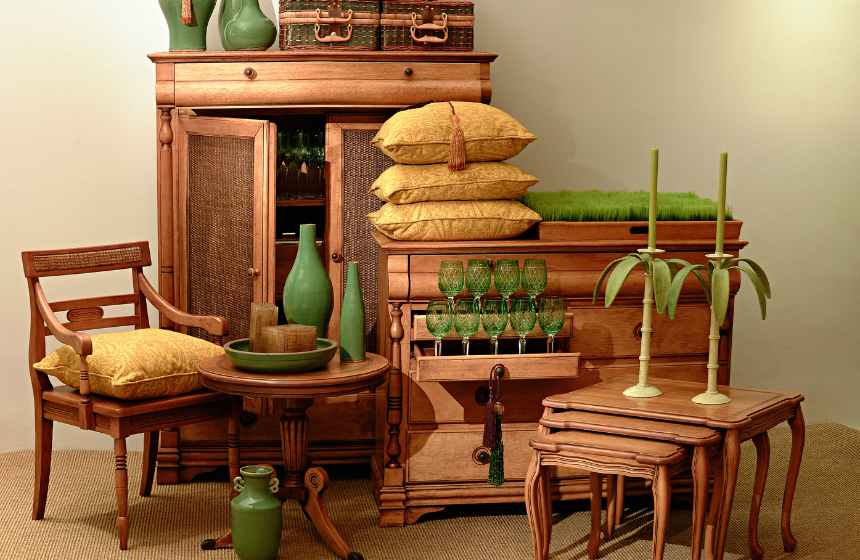
Use your imagination to turn used furniture into original library storage options. An old ladder may be transformed into a chic bookcase for showcasing books and ornaments by painting it and mounting it against the wall.
Stacking vintage suitcases creates a useful storage option that also adds personality and charm. By adding cushions and a soft throw blanket, you can turn an old coffee table into a reading nook and create a comfortable area for perusing your collection.
3. Customized Bookends
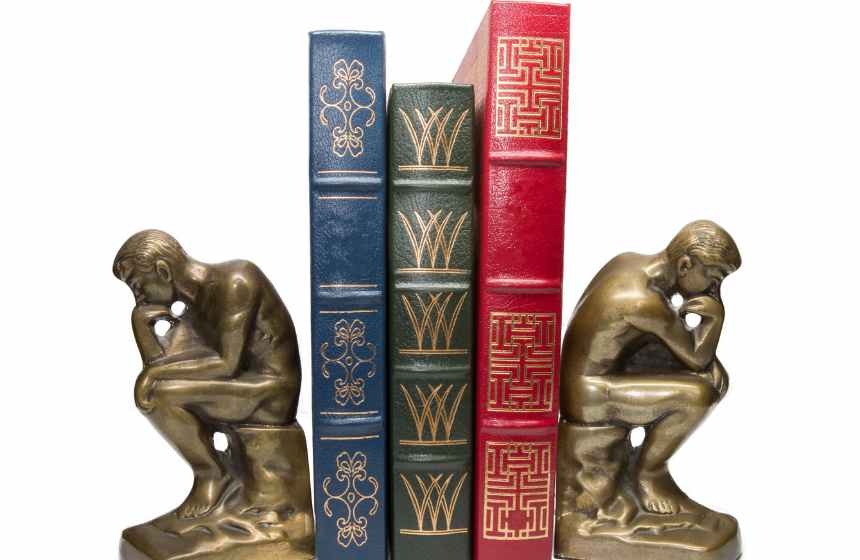
Making your own bookends is a great way to give your shelves a unique touch. You may create bookends that complement your style using materials like metal, stone, or wood.
Sand and stain wooden blocks for a rustic appearance, or paint them in striking hues for a contemporary feel. You may also carve motifs or forms that represent your passions, like as geometric patterns, animals, or literary symbols, if you’re good with tools.
In addition to keeping your books neat, these personalized bookends express your individuality.
4. Mood boards
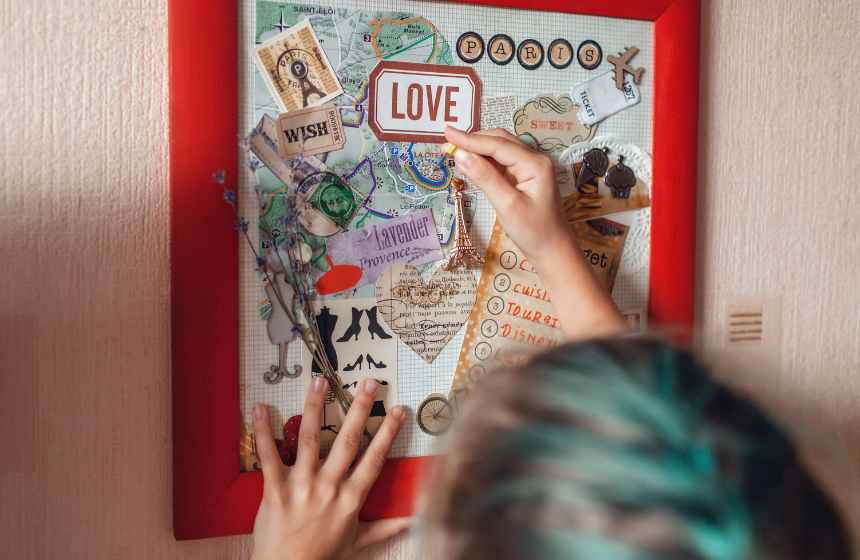
Making a mood board is a great way to see how you want your home library to look. Begin by gathering fabric textures, color swatch samples, and pictures of inspiring furniture and decor.
On see how these components complement one another, pin or adhere them on a board or canvas. You may use this visual guide to help you choose furniture, paint colors, and decorative details in a coordinated manner.
A mood board may help you create your library more efficiently and make sure it seems cohesive and well-planned, regardless of your style preferences—cozy, rustic, or sleek, modern.
Also Read: 12 Best Home Decor Products for Living Room
Conclusion
Creating a home library is a fulfilling project that lets you establish a private haven for reading and creativity. You may create a cozy, welcoming area that expresses your personal style and improves your reading experience by using these decorating ideas.
Your home library may serve as a knowledge and inspiration hub, regardless of your preference for a minimalist or homey cottage style.
Recent Posts
Here is reply of high-demand removable wallpapers. The wallpaper industry has changed a lot in recent times, with the launch of removable wallpaper being seen as a blessing for homeowners, renters,...
Brown is an often neglected color when considering interior design but brown decor living room ideas could make your house feel warm, sophisticated, and timeless. More adaptable than any other...
